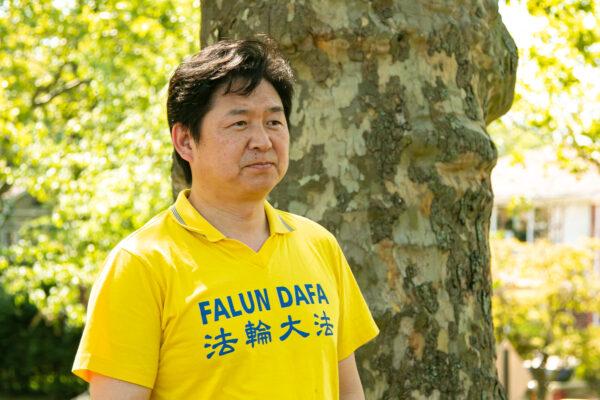FLUSHING, N.Y.—Zhang Jian’s face lit up as he walked out of Kissena Park. He waved toward the stream of cars that arrived and chatted with a few drivers who rolled down their side windows, his eyes slightly squinting under the midday summer sun.
On each of the dozens of cars was a banner pinned to the side, varying in hues of white, azure, or golden yellow, which matches the color of his shirt. On July 18 and 19, the group of drivers—made up of adherents of the spiritual practice Falun Gong—toured across Queens, Manhattan, and Brooklyn, in a show of support to their counterparts in China, who have been the target of a violent persecution campaign since 21 years ago.
Each year around mid-July, Falun Gong practitioners around the world commemorate the anniversary and the resilience that carried them through the decades-long suppression.

A wistful look came over Zhang’s face as he recalled the haunting years he spent in Chinese jails while resisting the regime’s coercion.
July 20, the day the Chinese regime launched its persecution, was a turning point for an estimated 70 million to 100 million adherents in China. For Zhang, who eventually got smuggled out of China following four arrests and brutal torture, the day invokes a mix of pain, nostalgia, and an urge to express the words he had long kept unsaid.
No Place to Set Foot
First introduced in China in 1992 amid a booming interest in “qigong” meditation exercises, Falun Gong, a spiritual practice with moral teachings centered around the tenets of truthfulness, compassion, and tolerance, enjoyed explosive popularity in the late 1990s.The Chinese Communist Party (CCP) initially endorsed the practice and its health benefits. But Falun Gong’s vast following—far exceeding the Party’s membership by the end of the decade—was perceived by the regime as a threat to its power, leading to a statewide campaign to eradicate the practice that continues to this day.

Zhang, who is from northeastern Jilin Province where the practice was first introduced, was in his 20s when the campaign began. He said the state media’s hate propaganda vilifying Falun Gong practitioners created an atmosphere so fearful and toxic that all relatives and friends would turn him away.
“It felt as if in the vast land of China, there was not a tiny space for you to stay or hide,” he said in a recent interview.
In 2002, three giant banners with messages supporting the practice were hung up on a bridge in his hometown Tonghua city. The provincial authorities took it as a major transgression and arrested more than 100 local practitioners in an effort to find out who was behind it. Zhang, whose young age and expertise in mechanics made him a principal suspect, became their target for retaliation.
To make Zhang “confess his crimes,” a burly guard with extraordinary strength shackled Zhang to a heavy metal chair, and grabbed him by the hair to swing the chair around. Zhang’s hair was pulled off in batches. When the torture session was over, the concrete floor was covered in his sweat. Bean-sized bald spots appeared all over Zhang’s scalp, Zhang recalled, as his eyes reddened and his voice quivered. At the time, his remaining hair stood up and appeared charred, he said.
Other torments the guards applied included jamming a lighter deep into his chest, causing bruises and internal injuries, and squeezing a full tube of wasabi paste into his nose. Zhang, who was not involved in hoisting the banner, ended up admitting the false charge in order to avoid further agony.
The detention lasted for 18 months, with Zhang spending the latter period mostly sitting motionless in a single cell. When he was released, his face was ghostly white. His legs became so stiff that he could not walk for two or three months.
In 2007, facing another arrest, Zhang escaped through a four-day-five-night journey on a bus, then the only form of transportation that didn’t require security screenings, eventually arriving in Thailand. When he saw the local practitioners there, many who had fled China like him, he felt as if the “sun had just come out and the sky brightened up again,” he said. “Seeing them made me feel that I again had family and a home.”
He now resides in New York with his son, who reunited with him in 2013 at the age of 12.

A Different Voice
The car parade Zhang participated in became an annual tradition several years ago. But this year, it took on an extra layer of significance amid the virus pandemic, when other means of raising awareness—such as parades and rallies—became impractical.Zhang said he was heartened to see his fellow practitioners that day, whom he hadn’t seen during the months of lockdown. Many passersby stopped to take photos of the cars, while others clapped and gave them thumbs-up signs.

Reflecting on the Falun Gong persecution, Zhang said that under communist rule, the regime sets the standards for right and wrong, denying 1.4 billion people the chance to “hear a second kind of voice,” and accordingly, their ability to make independent judgements, he said.
“They [the Chinese regime] may tell lies as if they are truths, and confuse wrong with right, and you just have to believe them,” he said. “What we do presents them [the public] with a different voice.”
Thanh Nguyen and Thao Truong, a Vietnamese couple from upstate New York, drove two hours to join the car parade. Both immigrated to the United States to flee communist persecution, and credited their experience with giving them more clarity about the nature of communism.

Truong’s grandfather was a victim of communist Vietnam’s massive land reform campaign, Truong said. After the communists took over North Vietnam in 1954, they branded him a landlord and buried him alive. Nguyen’s family, meanwhile, incurred the communist regime’s wrath due to Nguyen’s brothers having fought against the communists’ control during the Vietnam War. The Vietnamese communist regime, in their eyes, is nowhere representative of their homeland, the same way the CCP is not equivalent to the country of China.
“We want to show that they [the Falun Gong practitioners under persecution] are not alone—We understand them and we are here for everybody in China,” Nguyen said.

Quitting the Party
Their efforts also parallelled a grassroots movement called “Tuidang,” meaning quitting the Party in Chinese, which has been steadily gaining momentum since 2005. The New York-based Global Tuidang Center has processed close to 361 million requests from the greater Chinese community to publicly renounce their ties with the Party and its affiliate organizations.For Zhang, such actions are more than symbolic: they signify people’s resolve to support what’s right and not stand by a regime that has blood on its hands, he said.
Many Chinese have been deceived by the Party’s lies, he said. “How can you not stop it when they [CCP] is feeding good people poison?” he said.
Truong nonetheless believes that the days for such lies may be numbered.
In the end, “truth is always the truth,” she said.





